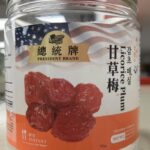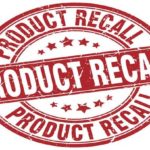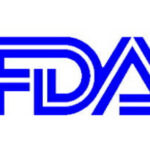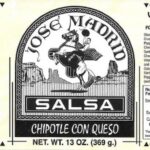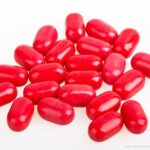Tops Jams are being recalled because they contain the unapproved food dye carmoisine, that can cause health problems in some people. According to a study published by the National Institutes of Health, the dye can alter the function of the liver and kidneys, and can induce cancer. The safe level of consumption of this dye is low dose. No illnesses have been reported to the company to date in connection with the consumption of this product. The recalling firm is Mangalm of Newark, California. Al of Tops Mixed Fruit Jams and Tops Strawberry Jams are included in this recall. The recalled products are Mixed Fruit Jam packaged in 475 gram containers with the best before date 10/06/2026 and batch number 4F1101. Also recalled is Strawberry Jam, also packaged in 475 gram containers, with … [Read more...]
Gina Marie Bakery Cookies Recalled For Dyes, Nuts, and Sesame
Gina Marie Bakery Cookies are being recalled because they may contain food dyes, nuts (almonds), and/or sesame that are not declared on the label. Not all of the cookies have all of these allergens. Anyone who is sensitive to food dyes, or who is allergic to almonds or sesame could have a serious reaction if they eat these products. No illnesses or allergic reactions have been reported to the company to date in connection with this issue. The recalling firm is Gina Marie Bakery. The recalled products include: Italian Mixed Vanilla Cookies for Undeclared Almonds, Sesame, Red 40, Red 3, and Blue 1 Italian Sesame Cookies for Undeclared Yellow 5, Red 40, Yellow 6 Vanilla Chocolate Dipped Cookies for Undeclared Red 40 Vanilla with Apricot Jam Cookies for Undeclared Red 40 and … [Read more...]
Jessie Lord Bakery Lemon Meringue Pies Recalled For Yellow #5
Jessie Lord Bakery Lemon Meringue Pies are being recalled because they may contain the food dye Yellow #5. While this additive isn't an official food allergens, many people experience discomfort when consuming it. Because this recall notice was posted on the FDA's Enforcement Reports page, and not the regular recall page, there is no information about whether or not any reactions have been reported to date in connection with the consumption of this product. The recalling firm is Jessie Lord Bakery of Torrance, California. The pies were sold at the retail level in these states: Alabama, Arizona, California, Connecticut, Kansas, Louisiana, Michigan, Missouri, Oklahoma, Pennsylvania, Tennessee, Texas, Virginia, and Wisconsin. No pictures of the recalled products were provided in the … [Read more...]
President Brand Licorice Plum Recalled For Sulfites and Color
President Brand Licorice Plum is being recalled because it contains undeclared sulfites and the unallowed color amaranth. Anyone who is sensitive to sulfites could have a serious or life-threatening allergic reaction if they eat this product. And amaranth is also known as FD&C Red No. 2, which was banned by the FDA in 1976 because of concerns about its potential carcinogenicity. No illnesses or allergic reactions have been reported to date in connection with this issue. The recalling firm is East CK Trading of Long Island City, New York. The recall notice states, "The consumption of 10 milligrams of sulfites per serving has been reported to elicit severe reactions in some asthmatics. Anaphylactic shock could occur in certain sulfite sensitive individuals upon ingesting 10 … [Read more...]
Golden Crop Candy Recalled For Undeclared Food Dyes
Golden Crop Candy is being recalled because it contains undeclared and unallowed food dyes Blue 1, Red 40, and Acid Red 18. People may be sensitive to those food dyes. Because this notice was posted on the FDA's Enforcement Reports page and not the regular recall page, there is no informant about whether or not any adverse reactions have been reported to the company to date in connection with the consumption of this product. The recalling firm is Blooming Import Inc. of Brooklyn, New York. This candy was sold at the retail level in the following states: New York, Pennsylvania, Maryland, New Jersey, Massachusetts, Missouri, Delaware, and Texas. No picture of the candy was provided in the recall notice. The recall initiation date was March 5, 2025, but the classification date was … [Read more...]
Las Ollas Botana Mix Snacks Recalled For Undeclared Allergens
Las Ollas Botana Mix Snacks are being recalled because they may contain the allergens sesame, soy, wheat, and food dyes that are not declared on the product label as required by law. Anyone who is allergic to those ingredients, as well as anyone who has celiac disease, could have a serious reaction if they eat this product. No illnesses or allergic reactions have been reported to the company to date in connection with the consumption of this item. The recalling firm is Kedake, Inc. of Houston, Texas. This item was sold in Texas through wholesale and retail stores. It was not for sale online. No picture of the recalled product was provided in the recall notice. The food dyes that are in the product are Yellow No. 5, Yellow No. 6, and Red No. 6. The recalled product is Las Ollas … [Read more...]
FDA Revokes Authorization For Use of FD&C Red Dye No. 3
The FDA has revoked authorization for the use of FD&C Red Dye No. 3 in food and ingested drugs, based on the Delaney Clause. That clause prohibits FDA authorization of a food additive or color additive if it has been found to induce cancer in humans or animals. The FDA revoked the authorization for some synthetic flavors based on this Clause in 2018. Two studies showed that cancer in laboratory male rats that were exposed to high levels of FD&C Red No. 3 occurred due to a rat-specific hormonal mechanism. This mechanism does not exist in humans. Relevant exposure to this color for humans is typically much lower than the exposures that caused the cancer in rats. Claims that the use of FD&C Red No. 3 in food puts people at risk are not supported by available scientific … [Read more...]
Jose Madrid Chipotle Con Queso Salsa Recalled
Jose Madrid Chipotle Con Queso Salsa is being recalled because it contains the food dyes Yellow #5 and Yellow #6 that are not listed on the label. People can be allergic to those dyes, and can suffer serious reactions if they eat products made with them. No illnesses or allergic reactions have been reported to the company to date in connection with the consumption of this product. The recalling firm is Jose Madrid Salsa. The recalled product was sold at these events in New York and North Carolina: Christmas in the Country event in Hamburg, New York on November 7 to November 10, 2024 Syracuse Holiday Shoppes event in Syracuse, New York on November 8 to November 10, 2024 Greensboro Holiday Market event in Greensboro, North Carolina on November 15 to November 17, 2024. The … [Read more...]
D-LO’s Gourmet Pistachio Cheesecake Recalled For Allergens
D-LO's Gourmet Pistachio Cheesecake is being recalled because it may contain wheat and soy, along with food dyes Yellow #5 and Blue #1 that are not declared on the label as required by law. Anyone who is allergic to those ingredients could have a serious reaction if they eat this product. Because this recall notice was posted on the FDA's Enforcement Reports page, and not the regular recall page, there is no mention about whether or not any adverse reactions have been reported to date. The recalling firm is D-lo's Gourmet Cheesecake of Detroit, Michigan. The recalled product was sold in the state of Michigan at the retail level. The recalled item is D-LO's Delightful Gourmet Cheesecake in Pistachio flavor. The product is packaged in a clear plastic container with a hinged lid that … [Read more...]
California Bans Red 3, Brominated Vegetable Oil, Other Additives
California bans Red 3, brominated vegetable oil, potassium bromate, and propylparaben from being added to food because of possible adverse health effects. The governor signed the legislation on October 7, 2023. Industry has until 2027 to comply with this new law. The synthetic dye, Red 3, is made from petroleum. The law, Assembly Bill 418, makes California the first state in the country to ban the use of these additives in packaged foods. The FDA says they are safe to consume. Center for Science in the Public Interest (CSPI) states that the FDA learned Red 3 was a carcinogen in the 1980s and declared it as a carcinogen in 1990. This 2012 article from The National Library of Medicine states that Red 3 causes cancer in animals. The FDA has eliminated the use of this food dye from … [Read more...]



